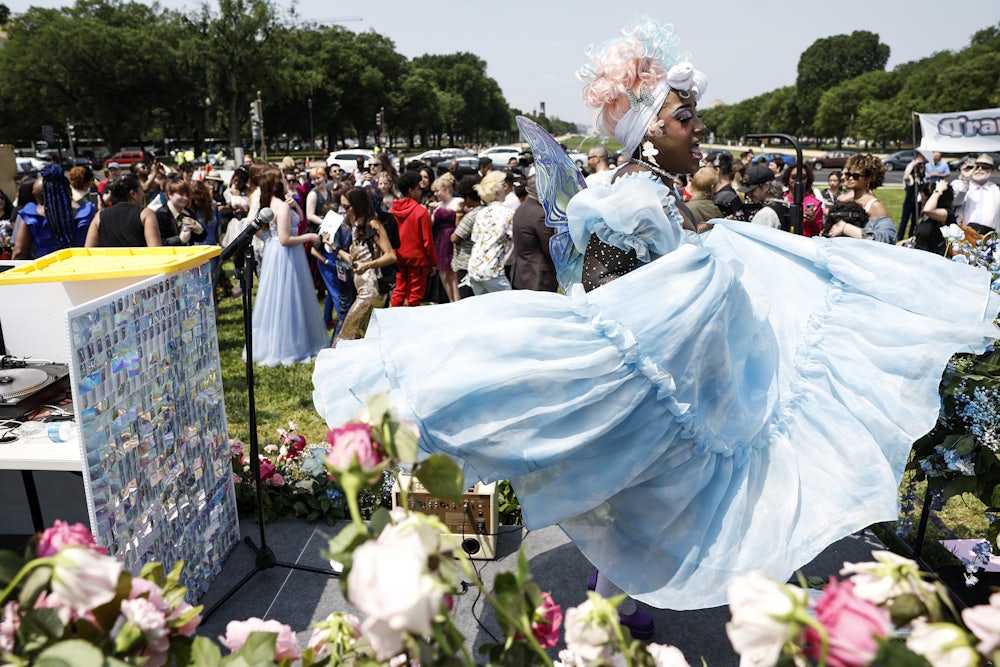Libby Gonzales had been waiting so long for prom—all she was waiting for now was her shoes. After looking at “literally thousands of dresses,” she’d chosen a long, black gown with “big floofy black sleeves,” and a tiered skirt, with a black headpiece. (I asked her if I was off-base imagining it as like the Wednesday dress, from the new Addams Family show on Netflix; her mom, Rachel, said I was not.) She would add a bag that looked like a clock, she told me over the phone a few days ago, “to represent how we’ve been waiting for this moment.”
Gonzales, who is 13, is one of the organizers of Trans Prom, which on Monday brought around 50 trans youth to Washington, D.C., in a two-for-one party and statement in the face of an unprecedented legislative, political, and cultural attack on young trans folks. In recent years, many of these tweens and teens have been to more legislative committee hearings and more demonstrations than they can count, often to block laws that seek to deny them basic rights. But the goal for this event was different—an attempt to recover what can get lost when a nation relies on teenagers to fight these battles. Gonzales and her peers wanted to do something “sparkly,” as she put it: a party for those who should have the space to worry about prom instead of having to worry about the latest smears from their state legislators or right-wing news personalities. “We were really frustrated, knowing how many bad laws were going to pass,” Gonzales said, “and we felt like we weren’t really getting a say in how we’re represented.”
Gonzales and steering committee member Grayson McFerrin-Hogan, who is 12, are both from Dallas, Texas. The state currently leads the country in anti-trans bills, with more than 50 introduced this year so far. Last week, the state passed a ban on gender-affirming care that Gonzales and her family, along with other activists, managed to stave off in 2021. The sheer barrage of laws introduced across the country, many of them copycat laws pushed by Christian nationalist groups without any real grassroots support, is part of a strategy to wear down opposition. Libby was seven when she first testified against an anti-trans bill. She has grown up as the right’s efforts to eradicate trans kids have ramped up. She has listened to the dehumanizing rhetoric about trans kids from lawmakers, session after session. And while organizing and defeating many of these bills is both important and urgent, sometimes she and other activists have wished for a way to respond that affirmed trans kids not solely in opposition to moral panics, but on their own terms.
The Trans Prom is part of that response, led by Gonzales, McFerrin, Daniel Trujillo, who is 15 and from Tucson, and Hobbes Chukumba, who is 16 and from Trenton, New Jersey. “Trans Prom came from the anger and exhaustion trans kids like me felt,” Trujillo said in a statement before prom, “after continuously fighting against anti-trans legislation and after continuously debating our personhood and our identity to people who don’t seem to care.”

To help pull this off, the youth reached out to Chase Strangio, a trans activist and lawyer whose day job at the American Civil Liberties Union puts him at the forefront of the fight against anti-trans laws in court. Actress and drag performer Peppermint, one of the few trans women to compete on RuPaul’s Drag Race, and who has served as the first ACLU Trans Justice Ambassador, also helped conceive the event with them. Together, they created this chance “to celebrate and be joyful instead of being depressed,” as Gonzales told me. Everyone contributed to the visual concept and the playlist. The guest list was collaborative, with invitations shared one-on-one and within the community. Given the evidence that far-right groups are escalating their threats on LGBTQ events this year, it’s understandable that Trans Youth Prom was not broadly advertised in advance. Despite that possibility, in the face of so much other opposition, all told, around 200 people came, including the kids.
With the Capitol as backdrop, the event kicked off with a dance party near Union Station late Monday morning. There was a stage ringed with pale pink, magenta, blue, and white roses, and drag performances, including one by steering committee member McFerrin-Hogan. As the guests arrived, they were greeted by parents and supporters. Democratic members of Congress sent messages of support, like Representative Ayanna Pressley and Senator Ed Markey, both from Massachusetts. Stormie Daie, a drag performer and adult supporter, emceed, as some of the kids took the stage. “We want to be clear,” Libby Gonzales said to the assembled crowd from the stage, “that no one made us trans or nonbinary—not our parents, not our schools, not the internet, not our friends. The fact that more of us feel free to proclaim who we are is something to be celebrated, not feared.” The event closed with a parade up Constitution Ave to the Supreme Court for prom photos.
Up against the fury of the anti-trans political movement, some may say that there’s no time off from the fight to spare. But no fight is worth winning if it means giving up dancing, to paraphrase an older sentiment. Trans Prom was meant to draw attention to just that: that it’s too easy for ordinary trans life to get subsumed under the terrifying headlines, and that it’s also important to stake out space to express joy, and to look cute (and Libby’s shoes did make it: custom black Converse high-tops with the pink stitching). It’s an act of defiance right now for trans teens to create something like this for themselves. Most of all, it was a party.










